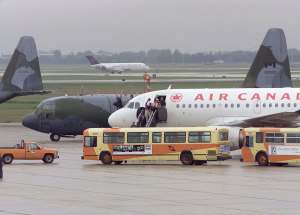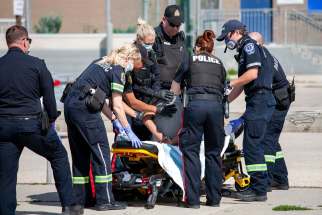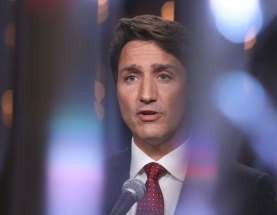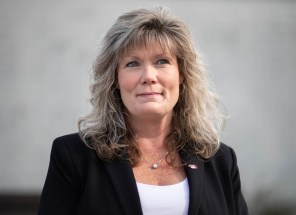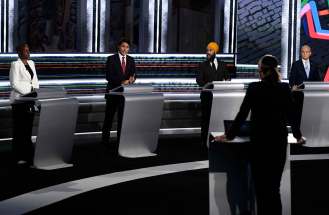Courage and conviction Afghan youth in Winnipeg unite to stand up for their tortured homeland
Read this article for free:
or
Already have an account? Log in here »
To continue reading, please subscribe:
Monthly Digital Subscription
$0 for the first 4 weeks*
- Enjoy unlimited reading on winnipegfreepress.com
- Read the E-Edition, our digital replica newspaper
- Access News Break, our award-winning app
- Play interactive puzzles
*No charge for 4 weeks then price increases to the regular rate of $19.00 plus GST every four weeks. Offer available to new and qualified returning subscribers only. Cancel any time.
Monthly Digital Subscription
$4.75/week*
- Enjoy unlimited reading on winnipegfreepress.com
- Read the E-Edition, our digital replica newspaper
- Access News Break, our award-winning app
- Play interactive puzzles
*Billed as $19 plus GST every four weeks. Cancel any time.
To continue reading, please subscribe:
Add Free Press access to your Brandon Sun subscription for only an additional
$1 for the first 4 weeks*
*Your next subscription payment will increase by $1.00 and you will be charged $16.99 plus GST for four weeks. After four weeks, your payment will increase to $23.99 plus GST every four weeks.
Read unlimited articles for free today:
or
Already have an account? Log in here »
Hey there, time traveller!
This article was published 10/09/2021 (1553 days ago), so information in it may no longer be current.
Late in the evening of Aug. 16, Bashir Faqiri was lying in bed when he sent a text to his cousin, Hameid. It was a day after the Taliban surrounded Kabul, the day after civilians fled to the airport in their bid to escape, thronging the tarmac and desperately clinging to the wheels of an American military plane.
Alone at home in Transcona, watching those chaotic images flash over his screen, Faqiri, 21, had an idea.
“Let’s organize a march/rally,” Faqiri texted his cousin. “What do you think?”
At first, Hameid didn’t reply; he was tied up with his own worries. His parents, permanent residents of Canada, and two sisters, who are citizens, were trapped in Kabul where they’d gone this summer for a wedding. They’d been given official guidance that the city was safe, that the Taliban wouldn’t advance to it so quickly.
Now, their flight home had been suddenly cancelled, and they were in hiding as the Taliban moved in.
By the time Hameid wrote back the next morning, Faqiri had decided on a course of action. He would try to unite Winnipeg’s small Afghan community, which according to the 2016 census numbers about 1,000, to gather in solidarity and call on the federal government for stronger action to help Afghan people.
Twelve days later, Faqiri was standing in front of the legislature in a suit and tie, surrounded by television cameras, telling them about his family, his fears, his hopes for the country. When he planned the rally, he thought maybe 20 people would show up; about 150 lined the steps of the legislature, holding signs and Afghan flags.
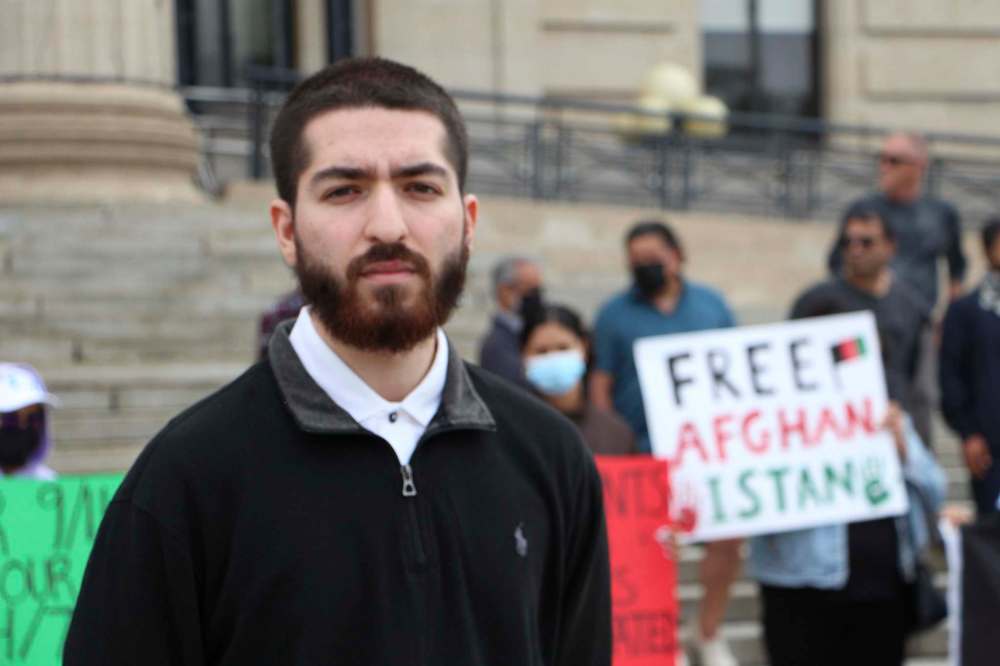
“It’s a lot to take in,” Faqiri admitted, as reporters crowded around him. “I’ve never done something like this.”
Reporters asked what he does for a living; he’s a University of Manitoba student, he replied, studying criminology and political science. Then he laughed a bit, aware of the incongruous mundanity of what he was about to say, at the heart of a rally about a major geopolitical crisis: “…and I work at Best Buy.”
It seemed to sum up the moment. Hours earlier, Faqiri had been just a student who sells computers and plays video games on streaming site Twitch and dreams of one day entering public office; now, he was the most visible Afghan-Canadian in the city, his face all over the news, fielding texts with messages like “how do I get my family out?”
One by one, Faqiri helped usher people to the microphone. Like him, most of them were young, no older than their 20s; they’d learned about the rally on social media and through friends. Most said they’d never spoken at such an event, but were driven by the emotion of the moment to use their voice.
Near the steps, Rashedeh, a 24-year-old student, began to speak. Anyone who knows her, she said, would know it’s unlike her to stand in the spotlight, but she needed to do what she could to raise awareness. Some had urged her to speak to be a “voice for the voiceless,” she said, but she rejected that framing.
“The truth is they have a voice,” she said. “It’s just that no one will listen.”

Rashedeh spoke about relatives trapped in Afghanistan, and about those who had ties to Canada but found, at their moment of need, that there was little help from the Canadian government to get to safety: “I thought Canada would care,” she said.
Faqiri invited community elders to talk, but many demurred: “they were saying ‘you know what, we would love to talk but it’s stronger if you (young) guys do it,'” he says. “They went through it and we haven’t, thankfully. They want our voices to be heard. They’re like, ‘we’re proud of you guys. You do it.’”
That youth movement has been part of the story, both here and abroad. Afghanistan is a young country: 60 per cent of its people are under age 25. They are a generation connected: when the Taliban seized Kabul, some of the most profound images came from young Afghan journalists and video creators with a global social media following.
Meanwhile, across Canada, rallies swelled with scores of Afghan-Canadian youth.
They are children of disruption, born to families who fled when the Taliban first swept to power and raised mostly in Canada. They learned the history of their homeland from their families’ stories and learned its present from satellite TVs beaming feeds of Afghanistan’s vibrant journalistic and pop-culture media.
This meant that the news they consumed about Afghanistan was not filtered through western media’s increasingly disinterested gaze, an attention span that grew shorter as the 20-year war dragged on; and unlike most Canadians, they could see themselves in the faces and stories of those most affected.
Now, as Afghanistan faces an uncertain future, they feel a responsibility to make sure it is not forgotten.
“I never thought I’d see myself as an activist,” Faqiri says, later. “I’m 21 years old, I’m supposed to be doing school, working a little bit, focused on other things. Now I have so much on my plate because I want to make sure everyone understands what’s going on.”

It’s the morning after the rally. Faqiri settles into a chair outside a Transcona coffee shop, dressed more like the student he is in a baseball cap and white T-shirt. It’s been a busy week — since being on TV he’s been getting recognized by neighbours and customers at work — but he’s glad to keep talking.
He’d noticed the generally youthful face of the rally, too. It has to do with the cycle of history, he thinks.
“Our elders, they’ve all escaped from this exact same scenario,” he says. “The same thing they went through 20 years ago, the same reason they’re here, it’s all happening again… now that it’s happening, the children have an idea what it’s like, and they don’t want other families to go through what their families did.”
He wasn’t always on a trajectory to be one of the local Afghan community’s most visible members. For a long time, he didn’t even pay much attention to what was going on in the country. So when did he start becoming so invested in the news coming out of Afghanistan, in its struggles, its future?
Faqiri gives a bashful laugh. “Um, literally the last couple months.”
Faqiri was born in Pakistan, where his father worked. His parents, both from Kabul, had married a couple of years earlier, holding their wedding in secret to escape the Taliban’s restrictions on such celebrations; in 2001, an uncle in Canada sponsored their immigration.
In Winnipeg, Faqiri grew up in a typical Canadian-kid life. His mother made sure he didn’t forget his Farsi, chiding him when he’d slip English words into their home conversations. When he was 13, his family visited Kabul for the summer, where he made friends and helped out running deliveries for his uncle’s jewelry shop.
But he also witnessed Taliban terrorism, and missed his first week of Grade 9 at River East Collegiate because it was too dangerous to travel to Kabul’s airport. After that, he vowed never to go back to Afghanistan.
He regrets saying that now, he says. Still, he was just a kid, and it was a lot to take in.
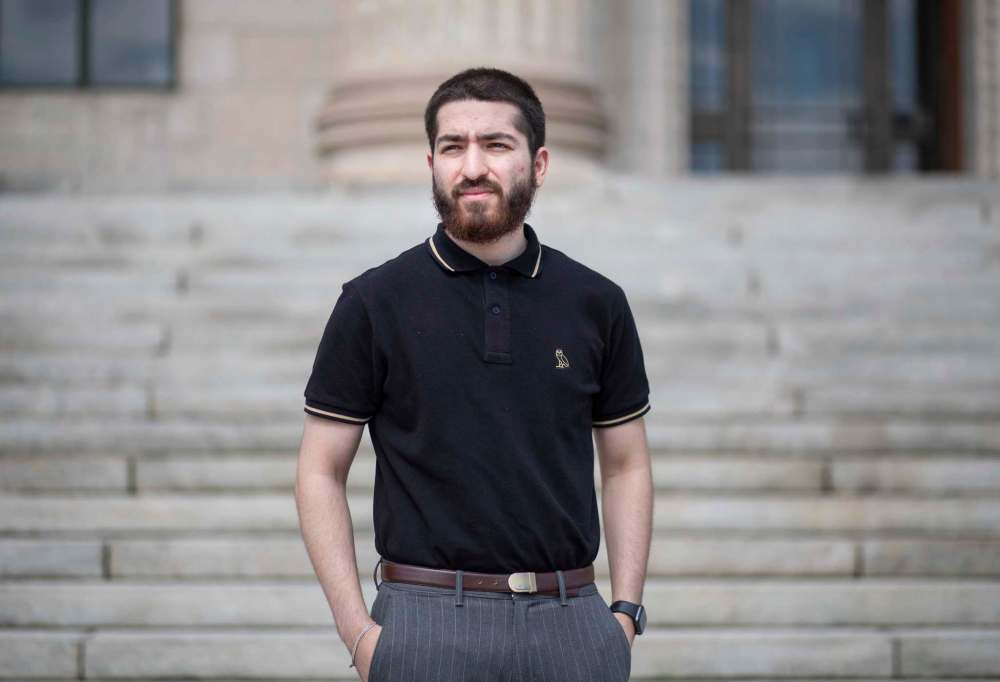
But this year, as the Taliban marched across the country, he followed the crisis on Afghan media such as TOLO News, and from his family. He talked to his coworkers and was dismayed when he realized they were hearing little or nothing about it on Canadian news.
He began to dive into comment sections on stories about Afghanistan, disturbed by the virulent racism he found. He got into a few debates on Twitter; once, a guy called him an “Islamist,” which was bizarre — “I was like, ‘what?’ It’s just crazy,” he says — which affirmed the sense he needed to raise his voice.
The comments get to him. He’s used to them, in a way, although he doesn’t forget the most egregious: when a reporter mentions a particularly genocidal tweet from a right-wing podcast host, who stated that for every dead soldier the U.S. should obliterate an Afghan city, Faqiri pulls up a screencap of it on his phone right away.
“When I saw that, I was like, ‘no way is this real,'” he says, shaking his head.
It’s the ignorance, he says. When he sees people shrug off what is happening in the country, he knows it’s because they don’t see in the news their family, their story; all Faqiri can see are the opportunities for his young relatives, especially the girls, that may now be vanishing.
That could have been him. That’s why, in part, he feels responsible to build support to help others.
“That’s the whole thing of it,” he says. “I’m always thankful that I’m here, that I’m able to go to university in peace, and be able to do this right now. It’s crazy to think if my parents weren’t here, I wouldn’t be here. I could be one of those numbers. I could be one of those statistics. It’s a scary thought, for me.”
”I could be one of those numbers. I could be one of those statistics. It’s a scary thought, for me.”–Bashir Faqiri
One of the cool things about the Aug. 28 rally at the legislature, Rashedeh says, is how it brought people together. She saw people she hadn’t seen since they were kids, and others she never knew; now they follow each other on Instagram. The Afghan community is diverse, she notes, but lately it feels more united.
“We’re willing to work with each other, for everything,” says Rashedeh, who prefers her last name not be used to protect family in Afghanistan. “We’re all connected and we all fear for our families lives back home. We really want to work together… I hope we can achieve some great things.”
In the days after the rally, Rashedeh was busy. She had two meetings with a local Afghan women’s group to help prepare to welcome a family of refugees; she was getting ready to finish her program at the U of M, where she’s pursuing a social work degree and hopes, one day, to become a lawyer.
She was supposed to finish the program this summer. She was so close. But as the Taliban began surging over Afghanistan she found the news unbearable; she’d go to sleep praying they wouldn’t take over the next city, and wake up to news that they had.
“I tried so hard to finish (my program),” she says. “I’d be like, ‘I’m ready to work, I’m going to ignore the world, I’m going to ignore Afghanistan.’ Then I’d open my laptop and just start crying in Tim Hortons. So awkward.”

Sometimes, her non-Afghan friends didn’t really understand. The journeys that lead people to Canada mean that every global event is much closer than it appears on a map, but that pain is not always visible to others. Still, she found support from her professors and from the Afghan diaspora, both locally and on social media.
Like Faqiri, Rashedeh was born in Pakistan, where her family had fled after the Taliban first came to power and began threatening her father directly. When she was a baby they moved to Iran, where her father was slain during a robbery; the perpetrators were never caught.
After that, the weight of the family fell on the shoulders of Rashedeh’s then-16-year-old brother, who worked hard and eventually secured their immigration to Canada. She was six years old when they came and, with her spirited personality, made friends quickly; she has few memories of life before coming to Winnipeg.

She has been to Afghanistan twice, visiting family in Kabul and both times falling in love with the country, with the mulberry trees on her family’s farm, the stark beauty of the mountains that wrap around the city. The first time she visited she was still a child, and excited by everything; going back at age 21 was more challenging.
“It was more depressing, because I was older,” she says. “People would open up to me more because I was an adult. I’d learn about their lives in war, which made it tough. My mom always says to me now, I’m more stressed about this… because I made those contacts.”
That’s part of why she decided to speak up, she says. There’s so much to say about the situation, from the political aspects of the American retreat to the humanitarian crisis in Afghanistan. She knows she can’t speak for everyone, but she feels as if she has a responsibility to make use of the opportunities she received.
“I have experienced so many amazing things, and I just want to give other people that chance,” she says. “That’s why I did the speech. I felt morally obligated. How can I sit here and be happy, while so many people of mine are suffering?”
One of the rally’s speakers made a comment that “Canada is lucky to have us.” That resonated with Rashedeh; it’s something she wishes was said more about welcoming refugees. She points to her own family, and how she and her siblings are thriving: all the things they’ve accomplished, the lives they are building.
”How can I sit here and be happy, while so many people of mine are suffering?”–Rashedeh
After the rally, Rashedeh was proud of herself. Her mother sent photos of her giving a speech to relatives in Afghanistan; they were touched. Knowing young Afghan-Canadians were speaking up made them feel as if they’re not alone, she says, because for so long it seemed as if their suffering was invisible.
At home later that day, she felt the warmth of the moment flowing closer to home.
“There’s an immigrant thing, it’s really hard to get your parents to say ‘I’m proud of you,'” she says. “Or maybe it’s universal, I don’t know. But after my speech at the rally, my oldest brother, he’s like a father figure to me. When he came home… he came over, he hugged me, and he was like, ‘I’m really proud of you.'”
The boots helped give her a little courage, Zobaida Mohammad Hussain says, with a laugh. She didn’t know there would be an open mic at the Aug. 28 rally, but when Faqiri invited folks to speak she realized she had a lot to say, and she’d worn a bad-ass pair of black boots, the kind that make you feel ready to take on the world.
So she got up there, and she struck a strong stance, and began to speak without having prepared anything: “I don’t think there are words that can describe what I’m feeling,” she began, but then the words poured out in an unbroken stream of righteous anger, and love, and determination.
She was disturbed, she said, about how “the world is making it look like the Taliban occupation is a popular uprising of the people.” She didn’t understand where that idea got started. She didn’t understand how what she saw in media seemed to describe the Taliban takeover as just another Afghan civil war.
“This is a group of terrorists who took the country from young people,” she said, and turned to look at the crowd, calling on all of them to stand together, Hazaras and Pashtuns and Tajiks. “Our people were sold by our corrupt leaders. This is the (Afghan) government putting money in their pockets, getting rich off our blood.”

A few days later, brushing away wasps outside a West Broadway coffee shop, Mohammad Hussain, 27, thinks about the speech. It’s not the first time she’s used her voice in this way: she and her sister, Saleha Mohammadi, share a YouTube channel and Instagram which they’ve used to amplify Afghan news and perspectives.
But the rally, one of a many held across Canada and elsewhere, was “the one chance we had as Afghans for the world to hear us,” she says, and so she felt a responsibility to tell the world what she saw, in the strongest terms: many people in the West don’t understand the complexity of the situation, she thinks.
“So many people don’t understand exactly how the whole takeover of the Taliban happened,” she says. “They just see it as, ‘OK, a bunch of Muslims that hate the West, they hate democracy, they love extreme sharia law, that’s what they want.’ If you follow Afghan media, you can see that’s exactly what they don’t want.'”
Mohammad Hussain has many reasons to fear the Taliban’s return. Her family is from Hazarajat, the mountainous heart of Afghanistan that is home to four million members of her Hazara ethnic minority, which has been oppressed for generations. The Taliban massacred thousands of Hazara during their first regime.
Faced with that discrimination in the mid-1990s, her father was forced to close his business. He fled with his family to Pakistan, and then to Iran and Uzbekistan, where they were able to get United Nations refugee designation and were assigned to Canada. Mohammad Hussain was 12 when they arrived in Winnipeg.
Although she had been a small child when they left Afghanistan, she never stopped loving it. In 2013, her family travelled back to Hazarajat, where she felt the pull of the land and culture. She spent nights lying under the stars, savouring the taste of local fruit, and being teased about her old-fashioned Farsi.
That connection is something she and her sister have been thinking about, lately.
“We’ve grown up as refugee kids,” she says. “We’ve lived in different countries. You can’t really feel a connection to the land. We don’t have generational wealth, we don’t have anything that will be passed on from our parents to us. I don’t know what it’s like to grow up somewhere you can say, ‘my grandfather planted that tree.’
“We love Canada,” she adds. “We see this as our country. But there’s still something pulling you back. There is that love, and that energy that pulls you.”
”We love Canada… We see this as our country. But there’s still something pulling you back. There is that love, and that energy that pulls you.”–Zobaida Mohammad Hussain
There are times when Mohammad Hussain feels “helpless,” she says. She worries about how refugees will make it to Canada, and what will happen to the Hazaras, and all other Afghans, too. The Taliban haven’t changed, she says, no matter what they say now, while the world is watching everything that they do.
But she sees hope in her peers in the country, in the energy that young Afghans bring: they “liberated themselves” during the period of American occupation, she thinks, taking the space opened after the fall of the Taliban in 2001 and using it to create opportunities and obtain education and build dreams.
“Whoever has grown up there in the last 20 years, with the freedom of press, and the arts, and the media, they are connected to the world,” she says. “I don’t know how the Taliban can keep them down… Afghanistan isn’t the same place as it was when the Taliban first took over, and the people aren’t the same either.”
In the meantime she plans to do whatever she can, whether that means helping refugees or speaking out again. Maybe by speaking, she hopes, Canadians will see the news that streams past the way she does, as more than words on a page: she wants them to see people trying to work, to fall in love, to build lives, to live free.
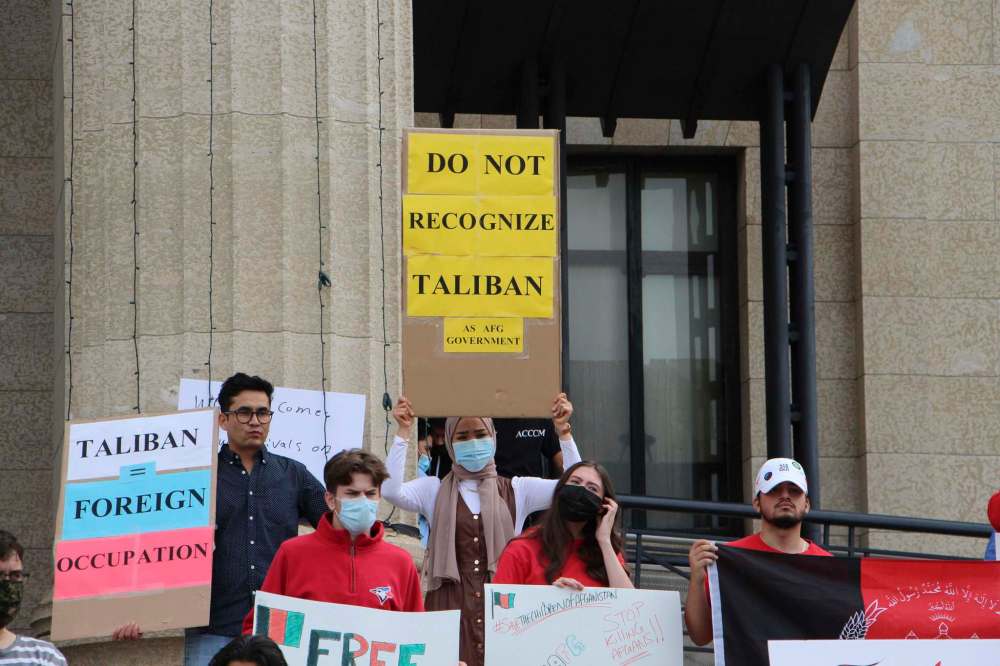
“If they forget everything else I’ve said, remember that,” she says. “See them as humans. Real people, whose lives are being affected. Real people, who are losing everything that they dreamed of.”
Already, by last week, the rush of headlines in Canadian media had faded. Now that there is no western presence in the country, there’s less interest in what happens to it. Yet in Canada the impact of what unfolded in Afghanistan is only just beginning: refugees are only just starting to arrive. The lines of connection will deepen.
As that future unfolds, the young voices raised in Manitoba over the last few weeks are just the beginning.
“If I can get one part fixed, or try to help out any way I can, then I can lean into helping other communities,” Faqiri says. “Palestine, Syria, Iraq, we’re all going through the same exact things. Being able to start somewhere and go on to help the entire country, the world, in the smallest way possible… that’s my whole end goal.”
melissa.martin@freepress.mb.ca
Our newsroom depends on a growing audience of readers to power our journalism. If you are not a paid reader, please consider becoming a subscriber.
Our newsroom depends on its audience of readers to power our journalism. Thank you for your support.


